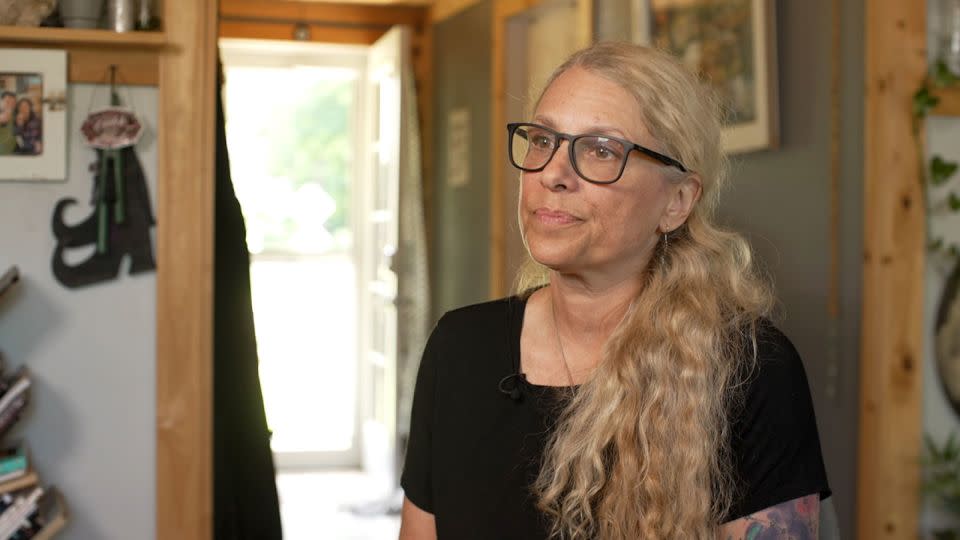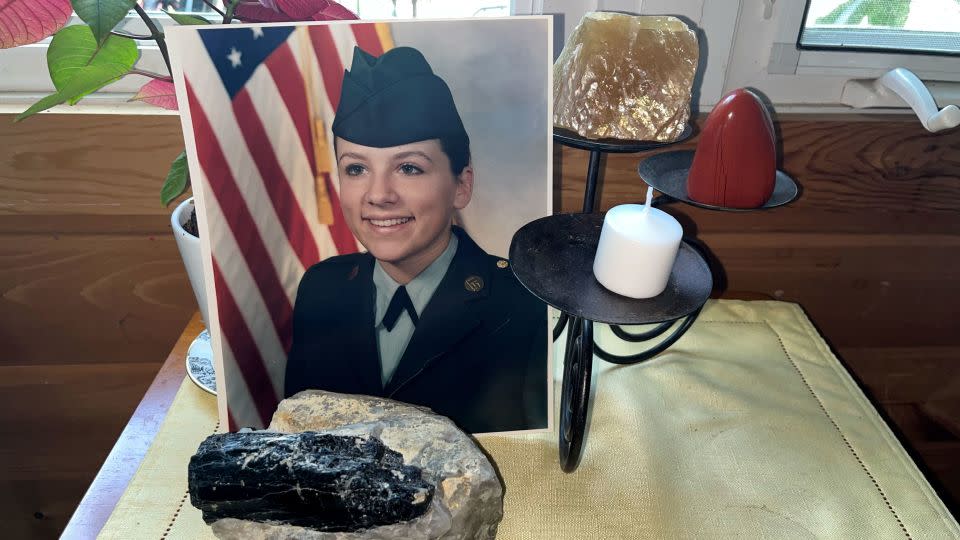A US Coast Guard Academy official says top leaders directed her to lie to sexual assault victims and Congress, making her an unwitting accomplice in a coverup of decades of abuse.
As a result, Shannon Norenberg says she’s resigning from her role as the academy’s head of sexual assault prevention and issuing a public apology to survivors, saying she is no longer willing to stay silent.
“The Coast Guard lied to me,” she wrote in a public statement posted online Sunday. “I can no longer in good conscience be part of an organization that would betray me, betray victims of sexual assault, and betray the system I helped set up to hold perpetrators at the academy accountable.”
Norenberg’s explosive allegations were made in advance of a congressional hearing this week at which the Coast Guard’s first female commandant, Adm. Linda Fagan, is slated to testify about the agency’s sexual misconduct scandal.
In an exclusive interview with CNN, Norenberg said she had made it her mission to help sexual assault survivors at the Coast Guard Academy for more than a decade. She said she was devastated when she recently discovered old records showing how leaders had used her as part of the cover-up of Operation Fouled Anchor, a secret internal probe into a history of sexual assault coverups that CNN exposed last summer.
She wrote in her public posting that she was sent on an “apology tour” in 2019 to brief dozens of assault victims about their cases, which had previously been mishandled by academy leadership. The list of talking points she was given at the time shows she was directed to tell victims that Congress was already fully aware of the operation, which she now knows was not the case. She believes this was intended to “dissuade the victims from contacting their Members of Congress.”
The Coast Guard said it was a mistake – not a conspiracy – for the talking point about Congress to be on the list given to Norenberg. The agency added that Coast Guard officials recently interviewed a now-retired Coast Guard officer present during those victim meetings, and she said the talking point was never brought up. Norenberg said she didn’t have a precise recollection of all the meetings, but noted she had one-on-one calls with several victims outside the presence of the now-retired officer. Norenberg also said that if she had been told that Congress was unaware, she would have notified lawmakers immediately.
“Why would anyone trust anything the Coast Guard has to say about Operation Fouled Anchor at this point?” she said.
Norenberg was also instructed to not include the historic assaults being investigated in data that Congress would see, she said, and was prohibited from offering survivors key paperwork that would have helped them access mental health services and veteran’s benefits available to sexual assault victims.
“We weren’t sent out there to help these people, I realized,” she wrote. “The whole thing was a cruel coverup at the expense of the victims, with the entire purpose being to preserve the image of the Coast Guard and avoid scandal. And the Coast Guard used me as part of their plan.”
For nearly a year, Fagan has been coming under increasing pressure as she continues to grapple with the fallout from Operation Fouled Anchor. She has repeatedly said she wants to learn from the past and move forward, but a new string of controversies has shown that sexual misconduct remains pervasive across the Coast Guard and is a far bigger issue than she has publicly acknowledged.
Among the developments:
-
Anonymous Facebook accounts dedicated to exposing how sexual assault cases have been mishandled and covered up across the service, not just at the academy, have drawn thousands of people in recent weeks. “They cannot bury this… do not let them scare you. The floodgates are open,” the anonymous former Coast Guard member behind one of the Facebook accounts, Whistler McGee, wrote in response to the many members sharing their own stories of sexual assault and harassment. When the social media firestorm erupted, Fagan emailed the workforce and encouraged victims to make formal reports — a response some commenters mocked. “Are you even listening? Do you grasp the overall issue which sparked all of these discussions?” one woman wrote. “Reporting incidents is your best course of action right now? THE REPORT SYSTEM HAS FAILED far too many of our members.”
-
Three Coast Guard survivors rehashed the details of their sexual assaults on camera as part of what they were told by officials was an education campaign that would be promoted during sexual assault awareness month in April. But after shooting the videos, public affairs officials warned that publicly promoting the testimonials “could continue to exacerbate the narrative … that the Coast Guard is in a sexual assault crisis now,” according to a copy of a memo reviewed by CNN. Officials ultimately posted the videos in a back part of the Coast Guard’s website in late May, but only after the survivors posted them online themselves. The Coast Guard attributed the delay in posting the videos, in part, to an internal debate over how to present the testimonies, and preparation needed for anticipated media and congressional attention.
-
The Coast Guard was forced to request that President Joe Biden withdraw and resubmit the names of dozens of Coast Guard officers for promotions from the Senate confirmation process in April. Records show that the two officers removed from the list had been previously accused of misconduct — one for making inappropriate sexual comments, the other for “negative matters of record associated with sexual assault.”
-
Another Coast Guard officer who was also set to be promoted to a high-level position is currently under criminal investigation for sexually harassing and groping a cadet who reported him to the academy two decades earlier. The allegations surfaced during testimony from the former cadet at a congressional hearing last year, but Coast Guard officials did not initiate the criminal investigation until months later, after the woman said she flagged his name on a promotion list to senators. Records reviewed by CNN show the officer was also reported for sexual harassment at a Florida bar last year. The Coast Guard confirmed the former cadet’s allegations are under investigation.
-
Multiple Coast Guard officials – including two chaplains – have been removed from their positions for “a loss of confidence.” This included the agency’s top chaplain, who the Coast Guard said failed to take appropriate action when he learned of another chaplain’s sexual misconduct. In a statement after his removal, the chaplain said he thought he had made the proper report at the time, but now believes that the information did not make it to all necessary officials.
Adding to the pressure on Fagan, congressional lawmakers have expressed growing frustration with the Coast Guard’s handling of the controversy. When Senator Ted Cruz’s office discovered non-disclosure agreements that had been given to sexual assault victims as part of Fouled Anchor to prevent them from speaking out about their alleged attacks, he slammed the practice in a letter to Fagan. Soon after, the agency issued a directive to no longer execute these agreements for victims.

Senators have accused Fagan of evading congressional oversight during multiple ongoing government investigations and questioned why current or former leaders have not been held accountable for covering up misconduct. Most recently, they demanded that she appear at a Senate hearing on Tuesday, saying the Coast Guard’s lack of cooperation with the ongoing congressional probe can “only be explained by either its indifference or another shameful attempt to cover-up the embarrassing truths of its mishandling of cases involving sexual assault and sexual harassment.”
Norenberg’s allegations have already been raised with senators and are expected to be part of the discussion at the hearing, her attorney told CNN.
‘Maybe this is the moment’
Victims echoed Norenberg’s concerns, saying they felt their lives were turned upside down when they were asked to recount the trauma they endured as part of the Fouled Anchor investigation, only to be forgotten once again.
“They didn’t care about the impact on us or why we wanted to share this information,” said one former Coast Guard Acadamy cadet who was visited by a Coast Guard criminal investigator in 2018. She originally reported being raped by a classmate in 2005, but no criminal charges were filed despite the alleged rapist being found by academy officials to have had “non-consensual” sexual intercourse with her. After giving her 2018 interview as part of Fouled Anchor, she said she never heard from the Coast Guard again about her case.
Even Norenberg didn’t know the full scope of the Fouled Anchor scandal until CNN’s reporting, which found that the operation had been quietly closed and hidden from Congress by agency leaders despite substantiating dozens of sexual assaults that had previously been mishandled at the academy. As a result, some of the accused had ascended to top roles at the Coast Guard and other military agencies, while some victims had left the academy after reporting their assaults and had spent decades coping with severe negative effects to their careers and mental and physical health.
Norenberg said she began questioning her involvement with Fouled Anchor after CNN’s reports and found in her files the five-page list of talking points that, she said, confirmed that what she had been part of was actually an organized effort to protect the Coast Guard’s reputation – not an attempt to help victims rebuild their lives. After finding the document, she knew she had to resign.
Norenberg told CNN she is frustrated that many of the issues exposed by Fouled Anchor, such as perpetrators going unpunished and victims facing retaliation for coming forward, still exist today despite messaging from Commandant Fagan claiming otherwise.
She had hoped that through her job leading the Coast Guard Academy’s sexual assault prevention efforts and working with victims, she could improve the culture. She says she helped victims file official reports to ensure their allegations were investigated and worked to improve access to victim’s advocates, but that a lack of appropriate consequences for many perpetrators remained troubling to her. Criminal prosecutions were rare, she said, with only three cases going to court-martial trials in her 11 years at the academy. And she said she repeatedly raised concerns to academy officials that accused sexual offenders who were kicked out of the academy were then allowed to enlist.


Norenberg said she notified officials of her intent to resign in late May. As she weighed her next steps, she reached out to an attorney named Ryan Melogy. She had learned of Melogy after he represented a US Merchant Marine Academy cadet whose rape allegations prompted a reckoning in the commercial shipping industry several years ago. When Norenberg told Melogy she was considering going public with her concerns, he asked her if she had seen the recent uprising on social media.
She had not. But later, after reviewing the litany of posts, where many current and former members said managers had looked the other way when they reported misconduct, she became even more emboldened. A military sexual assault survivor herself, she said her own memories of being raped by a boot camp leader when she was 18 years old had driven her into this line of work and now compelled her to come forward.
She said seeing that so many others were speaking up about how they felt betrayed by the Coast Guard gave her hope that it would now be impossible for the Coast Guard to ignore them. She is planning to start a YouTube channel where she will interview survivors — giving them a platform to speak out about their sexual assaults.
“Maybe this is the moment in time we can get people to listen to us,” she said.
What should we investigate next? Email us at blake.ellis@cnn.com or melanie.hicken@cnn.com.
For more CNN news and newsletters create an account at CNN.com
Source Agencies



